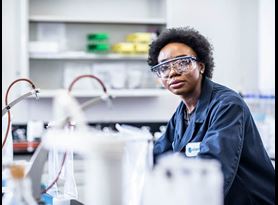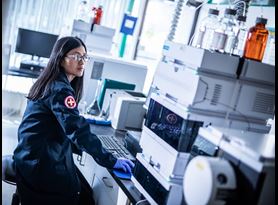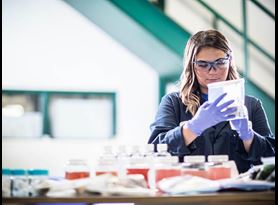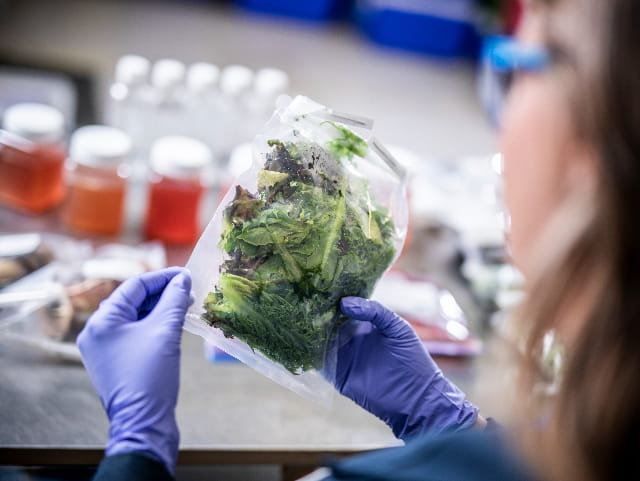Article
What You Need to Know About the FDA's 'New Era of Smarter Food Safety' Blueprint
The FDA’s“智能食品安全蓝图的新时代" builds upon the foundation created by the食品安全现代化法案(FSMA),通过重点关注和实施食物造成疾病的预防方法,而不是反应性,这在食品供应链中建立了风险和科学的保护。
The FDA’s approach to food safety, as outlined, aims to reduce the number of foodborne illnesses through a modernized, more digital, traceable, and safer food system using technology and other tools over the next decade. The ultimate goal, as described in the blueprint, is to strengthen the framework that enables the prevention of foodborne illnesses, leveraging a robust digital network that allows food to be traced to its source in seconds, alerting consumers in real time before the consumption of contaminated or misbranded foods. Additionally, the FDA “envisions a framework in which education, communication and democratization of data will enable industry, public health advocates and government to work in concert to keep the food supply safe.”
FDA最初计划在2020年春季释放蓝图,但是当Covid-19大流行反应努力优先考虑时,计划暂停。Covid-19危机强调了对食品供应链和食品系统的挑战和独特的需求,进一步巩固了坚固,灵活和数据驱动的方法,以确保强大而有弹性的食物系统。Food laboratories with a deep bench of expertise and experience are fundamental to the FDA’s data-driven, proactive and preventative approach to foodborne illness, employing a wide range of analytical methodology and partnering with stakeholders along the food supply chain to offer insights into best practices, process optimization and routine quality control measures.
Four Core Elements
The blueprint is built upon four pillars, also referred to as “the four core elements,” which include tech-enabled traceability, smarter tools and approaches for prevention and outbreak response, new business models and retail modernization, and food safety culture. Common themes throughout the core elements include a mutual reliance on state and federal partners, the need for reliable reporting and metrics as well as third-party audits, and the importance of a strong food safety culture. By bringing these four core elements together, the FDA believes the goals set within the blueprint can be achieved, ushering in a new era of smarter food safety.
Element partners with companies along the food supply chain, enabling organizations to achieve smarter food safety by implementing, maintaining and enriching a proactive, preventative and scientifically driven approach to foodborne illness and outbreaks. Our industry-leading experts have decades of experience in food safety, and actively partner with customers to build, sustain and strengthen robust food safety systems.
Tech-Enabled Traceability
当爆发食物中的疾病时,赌注很高,并且可以包括生命损失,损失产品数百万美元,消费者信任崩溃。此时,由于大多数记录是基于纸张的,因此不可能快速跟踪和追踪已移动通过供应链的食物,并且缺乏数据识别产品。此外,如在Covid-19流行期间所观察到的,缺乏立即的能见度阻碍了在公共卫生危机中理解供应链的能力。
FDA计划通过完成FSMA第204条规则来奠定基础,以提高可追溯性,以协调关键数据元素和关键跟踪事件。188金宝搏手机端通过标准化这些基本组成部分,可以在利用数字技术的供应链中的利益相关者中启用数据共享,从而大大减少识别食物污染源和/或食源性疾病爆发所需的时间。此外,FDA打算利用数字转型,优化能够实现技术的爆发反应和调查协议,与联邦,州,地方,部落和领土利益相关者合作。可追溯性工作已经在FDA进行FDA,用于其他受监管产品,例如FDA。在可能的情况下,医疗器械和药物,FDA正在寻求协调与这些其他产品的食品供应链所做的可追溯性工作。
与可信食物检测实验室的伙伴关系对于确保污染的源是适当的跟踪和识别的伙伴关系。合作伙伴食品测试实验室应配备现代化的实验室信息管理系统,深度的专业知识和快速交付结果的能力,以识别食源性疾病和/或污染的来源。此外,实验室必须彻底了解目前的监管景观,包括FDA的现代化和可追溯性努力,以促进和支持所需的科学数据报告,以便进行技术爆发反应所需的科学数据。
Smarter Tools and Approaches for Prevention and Outbreak Response
As part of their commitment to modernizing their approach to foodborne illness outbreak responses and recalls, the FDA is looking to build upon existing state-level partnerships where comparable regulatory and public health systems are in place, maximizing food safety reach and ensuring the optimal use of resources. By collaborating with federal, state, industry, consumer and academic stakeholders, the FDA can further the standardization and advancement of root cause analysis protocols specific to food safety. Additionally, the FDA believes that concerns regarding confidentiality and protection of proprietary information can be addressed while all parties work together to advance transparency. By standardizing the reporting format and criteria for root cause analyses, improving communication tools and integrating root cause data into the Agency’s risk ranking and predictive analytical systems, the FDA aims to increase the probability of predicting and mitigating future instances of food supply contamination and foodborne illnesses.
The FDA’s modernized food safety approach is supported by independent food testing labs that employ a variety of analytical tools and methodology, as the Agency looks to leverage private lab capabilities to identify potential outbreaks. Element’s risk-based approach to furthering food safety aligns with the FDA’s approach for prevention and outbreak response, with a strong focus on root cause analysis, quality control measures and process optimization. Partner with Element and together, we can be at the forefront of modernization within the food industry, working with the FDA to achieve a more robust and proactive approach to food safety.
The FDA plans to employ artificial intelligence and machine learning to bolster its predictive analytics capabilities, and the Agency has successfully performed proof of concept testing on artificial intelligence (AI) screening of imported foods at ports of entry. The FDA is also exploring the use of technology for inspection, training and compliance, including remote, virtual and/or component inspections of foreign and domestic firms, building on their experience conducting remote inspections of specific importers during the COVID-19 pandemic. Element’s food testing labs have extensive experience working with border authorities and the FDA to test and address imported goods that have been flagged for further inspection. Leading organizations trust Element’s import hold testing and consulting services for on-site sampling, rapid testing and coordination of reporting to regulatory authorities.
New Business Models and Retail Modernization
E-commerce and delivery models, in addition to the development of novel ingredients, new foods and new food production systems, are evolving that farm to table pathway for food. A more digital, traceable food system is the answer to diminishing foodborne illnesses and keeping consumers as safe as possible.
FDA正在探索现代化传统商业模式的方法,并确保通过新的和新兴市场销售的食物安全。为了支持新的商业模式,FDA正在与多个利益相关者(包括监管合作伙伴)合作,以确定潜在的食品安全漏洞,并确定如何在未来建立系统和流程以最佳地解决它们。食物检测实验室将在解决和检测食品安全漏洞方面不断至关重要。通过与可信食品检测实验室合作,以确定整个食品系统的潜在失败点或易感性,利益相关者可以实施积极的方法来预防食源性疾病和爆发。
Leveraging digital infrastructure is woven throughout the FDA’s plan to modernize the traditional approach to retail food safety, which includes digital incentivization to prompt and reward desired behaviors, including handwashing and monitoring temperatures manually. The Agency is also exploring the use of technology to enhance facility and equipment design, including developing and using smart commercial kitchen equipment with built-in automatic monitoring of time and temperature processes. In instances where smart commercial equipment is employed, routine lab testing will be essential to validate that baking and other temperature-controlled processes are lethal against foodborne pathogens such as salmonella.
Food Safety Culture
The "New Era of Smarter Food Safety" Blueprint emphasizes the FDA’s commitment to food safety culture, which extends to upholding food safety culture throughout the food system as well as further promoting food safety culture throughout the Agency. The FDA plans to develop a social marketing plan to strengthen the culture of food safety, as well as influence and sustain desired behavior changes. Additionally, the Agency will support the harmonization and development of tools that can be used by companies to assess their current food safety culture, partnering with both industry and academia. Consumer education is a high priority for the FDA, relying upon the use of prevalent technical tools, including smart phones, smart home devices and digital platforms to engage and reach consumers with Smarter Food Safety communications.
Within Element’s network of food testing labs, food safety is paramount. Ensuring the highest standard of food safety is at the core of our service offerings and approach. Our comprehensive suite of service offerings promote and strengthen food safety throughout the food supply chain, from routine testing to inspection and consulting services.
How the Right Food Testing Lab Can Help You Achieve Smarter Food Safety
By partnering with an independent laboratory with extensive expertise in food safety testing and deep regulatory knowledge, you can enhance your food safety programs and initiatives, implementing a preventative approach to foodborne illness, rather than a reactive one. With Element’s acquisition ofAvomeenin 2021 and分析实验室组(ALG)in 2020,188金宝搏手机端has combined complementary capabilities to offer an even wider array of services and value to stakeholders along the food supply chain, with an unwavering commitment to scientific excellence and quality, as well as exceptional client service and partnership.
Element’s broad network of food labs offer a comprehensive suite offood testing and consulting services, including food chemistry andmicrobiology testing,营养标签和保质期研究,食品联系测试和提交和一个广泛的供应链咨询中rt services.
通过介绍与您的相关文章Nucleus
Nearly 190 Years of Making Certain
More from Element

食物微生物学
Element provides food microbiology services for common foodborne pathogens, food spoilage organisms, and mycotoxins to HACCP, SQF, and R&D programs.
阅读更多

Nutrition Label Testing
Element’s food nutrition testing laboratories offer nutrition label testing to create and verify nutrition facts panels according to FDA and USDA requirements.
阅读更多

Shelf Life Study
188金宝搏手机端元素的货架 - 生活研究食品服务提供了可靠的数据,以帮助您确保您的食品稳定在日期之前最好的最佳稳定。
阅读更多
